If you’re pregnant without actually feeling pregnant, you’re not alone.
There are many women who feel just the same as you.
Almost every mom-to-be has thought, “I don’t feel pregnant anymore!” at least once during her pregnancy because they haven’t experienced fatigue, morning sickness, mood swings, or other pregnancy symptoms.
A sudden absence of all pregnancy symptoms followed by spotting and cramping may be a sign of miscarriage which is without a doubt one of the scariest things a pregnant woman can experience.
The good news is that this isn’t the only outcome of missing pregnancy symptoms as there are a variety of less devastating reasons behind you not feeling pregnant.
Here are some of the most common reasons why you don’t feel pregnant anymore.
When Is It Normal To Not Feel Pregnant Anymore?
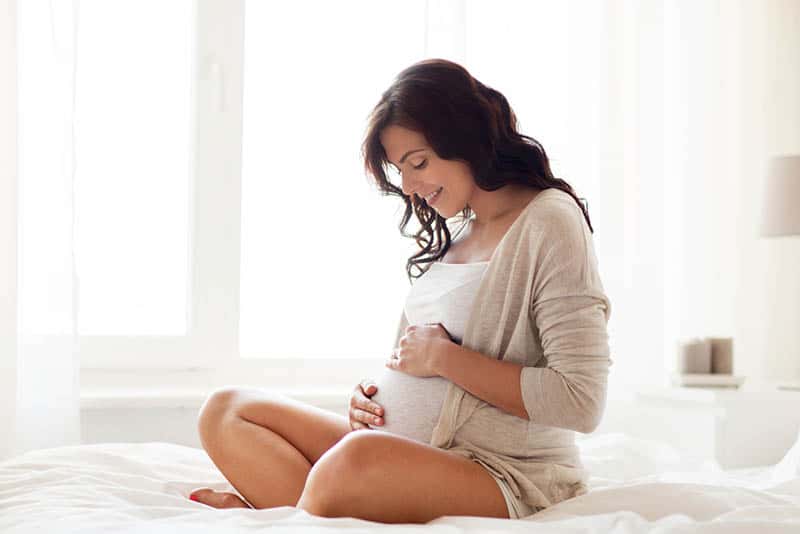
One of the most common misconceptions about being pregnant is that every pregnancy is the same or at least similar.
Expecting moms often compare how they’re feeling and while many of these pregnancy side-effects are the same for a lot of women, there are differences as well.
Pregnancy symptoms also vary day to day, so many mothers fear that the absence of symptoms might mean something’s not right.
This is especially true if this is their first pregnancy as the entire experience is brand new to them.
For example, many future moms notice things such as breast tenderness appearing one day, and disappearing the next.
Some symptoms might disappear just for new ones to take their place, so there’s no need to worry right away.
However, if all signs of pregnancy stop abruptly and you don’t feel any symptoms at all, that might be an early sign of miscarriage, which is why you need to be aware of the miscarriage indicators.
What are the symptoms of miscarriage?

Many mothers feel worried during the early pregnancy period when they can’t feel their babies move yet.
As a result, they’re on high alert for any small changes that might indicate that something is wrong.
Unfortunately, miscarriage is not uncommon and frequently happens because of a chromosomal abnormality that can’t be prevented.
Most miscarriages happen in the first 12 weeks of pregnancy, and the main symptoms are:
• Pink-white mucus discharge
• Contractions
• Cramping and back pain
• The sudden disappearance of all pregnancy signs and symptoms
• Light to heavier bleeding
• Clumps of tissue with clots
If you notice any of these miscarriage symptoms, get in touch with your doctor immediately.
Bleeding during pregnancy

Anxiety, stress, a yeast infection, and implantation bleeding are some of the most common reasons for light bleeding and spotting.
It’s no surprise that many moms-to-be become stressed as soon as they notice a drop of blood because they immediately associate blood with miscarriage.
However, it’s not always the case as there are a variety of reasons why a pregnant woman might bleed.
Anxiety and stress can cause spotting during early pregnancy, which is relatively harmless in the beginning but can lead to miscarriage.
Doctors strongly recommend bed rest and a peaceful environment for pregnant women to lower their stress levels and keep them calm.
A yeast infection can also cause light bleeding, but there’s no need to fear, as these infections won’t harm the baby or affect her development in any way.
Implantation bleeding is a very common occurrence that happens somewhere in the first two weeks of pregnancy.
It typically happens during the expected time of the menstrual cycle and the reason for that is the attachment of the fertilized egg to the uterus lining.
This type of light bleeding doesn’t require treatment.
However, if spotting continues or turns into heavier bleeding followed by cramping and the disappearance of pregnancy symptoms, it’s time to call your doctor and check the cause and pregnancy status.
I Don’t Feel Pregnant Anymore In The First Trimester

Most first-time mothers, women who’ve used IVF, and those who’ve had several miscarriages before, worry about everything that’s happening during the early stages of pregnancy.
The anxiety each woman experiences typically disappears once she feels her baby move for the first time.
It’s natural to feel more pregnant once the baby bump finally starts showing, but it doesn’t mean you won’t experience any pregnancy symptoms before that – it’s just that some symptoms go unnoticed or you don’t associate them with pregnancy.
In addition, your symptoms can come and go, so one moment you could feel fine and the next day you could get hit by various symptoms at once.
It’s important to note that pregnancy symptoms can’t occur before the implantation, a period when you start producing the hCG hormone which causes early pregnancy symptoms such as fatigue, nausea, bloating, and frequent visits to the toilet.
Women who don’t have any early symptoms except a missed period are one of the lucky few.
As your pregnancy progresses, the risk of miscarriage will decrease and drop to a 2 – 3% chance at the beginning of the second trimester from 21% in week 5.
I Don’t Feel Pregnant Anymore In The Second Trimester

For most women, the second trimester marks the end of symptoms such as sore boobs and food aversions.
However, unfortunately, frequent urination sticks around until you give birth (if you’re not extremely lucky to skip that part).
During this trimester, women will experience a huge energy boost which is a great change from the fatigue and exhaustion in the first 12 weeks of pregnancy.
The second trimester is considered the best period of pregnancy, some even call it the “honeymoon phase” because there aren’t any physical symptoms and unpleasantries that might make you uncomfortable.
This is a relaxing period and a great time to prepare everything for the arrival of your little bundle of joy.
RELATED: 22 Second-Trimester Must-Haves And Essentials
However, some mothers might find the disappearance of the early symptoms rather strange and uncomfortable and it might even seem to them as though they’re no longer pregnant.
If you heard your baby’s heartbeat at the 6 or 8-week ultrasound and had the 12-week scan without news of a missed miscarriage, you can finally relax and enjoy your pregnancy.
I Don’t Feel Pregnant Anymore In The Third Trimester
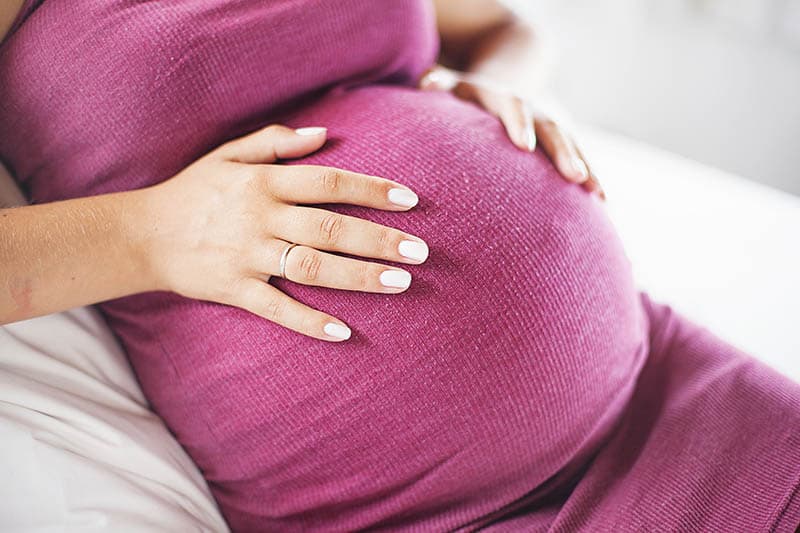
During the third trimester, most women experience extreme tiredness, sore breasts, bloating, and back pain.
But, some women feel as though they suddenly stopped being pregnant, meaning that all symptoms just disappeared.
Although it’s understandable that this could be a cause for concern, if you can feel your baby move, there’s no need to worry.
Pregnant women aren’t supposed to feel terrible all the time during pregnancy, but if you don’t feel like everything’s okay, you can always get a private scan or schedule an appointment with your doctor.
I Don’t Feel Pregnant Anymore: 15 Reasons Why
1. No morning sickness
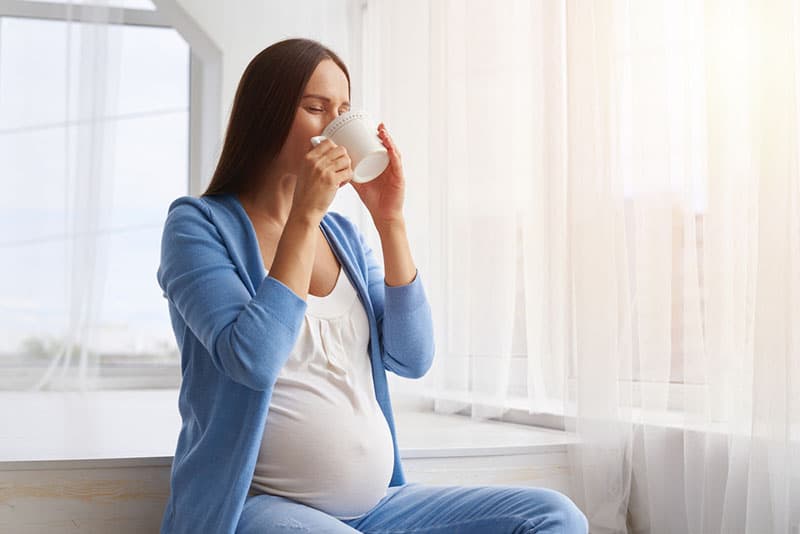
This is one of the most common symptoms of pregnancy and one of the most well-known ones.
Most pregnant women pray for the day their nausea finally goes away as it can be difficult to deal with.
Of course, you won’t start throwing up the day after your baby is conceived or the minute you see a positive pregnancy test, although you might feel a bit nauseous thanks to the excitement.
Some women never feel nauseous during their pregnancy, which is a blessing.
Not having morning sickness doesn’t necessarily mean you’re not pregnant anymore, it’s just a great reason to celebrate!
2. Irregular periods

When you have regular periods, you can more or less pinpoint when you ovulated and when you most likely conceived.
But with highly irregular periods, this can be difficult to gauge.
When you don’t know whether your period is late due to pregnancy or simply because it’s always late, you’re likely to miss pregnancy symptoms or chalk them up to being sick.
Then, when you do realize you’re pregnant, you might think “Well, I don’t feel pregnant” simply because you didn’t notice the symptoms.
3. Free from strange food cravings

I’m sure you’ve heard at least once in your life how pregnant ladies have strange food cravings that have to be fulfilled immediately or else they get very angry.
Jokes aside, food cravings are actually a far less common pregnancy symptom than you might think.
Not eating pickles and chocolate at the same time doesn’t mean you’re not pregnant.
However, if you do have a craving for a specific food, feel free to indulge yourself while keeping your health and the health of your baby in mind.
Every woman goes through a unique experience of pregnancy and birth, so don’t compare yourself to others – enjoy your own experience and get ready for your little bundle of joy.
4. Late pregnancy symptoms
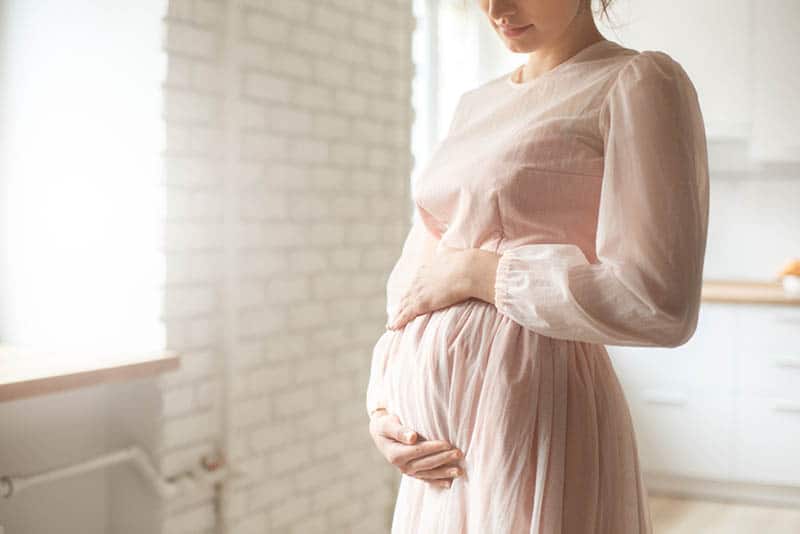
Although it sounds rather unbelievable, there are women who don’t experience any symptoms of pregnancy during the first trimester.
Even though this sounds great at first, it’s not. Actually, not having any of the regular symptoms during the first trimester causes a great amount of stress because many women frequently fear they’re not pregnant anymore.
Since a pregnant woman should stay physically and mentally healthy, it’s essential to reduce stress and relax in a peaceful environment.
Finally, if you are asymptomatic, you don’t have to worry about staying this way for the remainder of your pregnancy.
There’s still a high chance you might experience some or all of the symptoms during the second and third trimesters.
5. No mood swings

Most women undergo major changes during pregnancy, especially during the last month of being pregnant.
Therefore, it’s completely natural to experience certain mood swings, even more so if this is your first pregnancy.
However, not going through this stage doesn’t make you any less pregnant than any other mom-to-be.
There’s no need to feel embarrassed or anxious over whether you’re having mood swings or not.
But, if you find this to be a source of excessive worry, mention it to your doctor at your next check-up.
6. High libido

When you experience symptoms such as fatigue, bloating, and morning sickness (that usually continues throughout the whole day), you might feel surprised when you experience a high libido.
You might even think that you’re not pregnant anymore as all of these symptoms at the same time can feel confusing.
Actually, it’s completely the opposite. Pregnant ladies can actually have a high libido and it’s completely normal.
You have nothing to worry about, so relax and enjoy this time with your partner.
7. Shoe size doesn’t change

The hands, joints, and feet are the most common victims of swelling during pregnancy.
Some women even struggle with putting their shoes on, so they have to go one size up or more.
Thankfully, there are maternity shoes perfect for swollen ankles and feet.
However, some women might be free from this rather uncomfortable experience, which can actually make them more nervous than happy.
Just because you might not have swollen feet doesn’t mean you’re not pregnant anymore or not pregnant “enough”.
Excessive swelling can be a sign of high blood pressure and preeclampsia, so take note of any other symptoms that might occur during this time.
8. Normal dreams

Even though vivid pregnancy dreams are not reported as an official pregnancy symptom, many pregnant women say that they have strange dreams that can occasionally turn into nightmares.
However, this is not the norm for every pregnant lady, so even if you don’t have any weird dreams, don’t worry, you’re still pregnant!
9. Tons of positive energy

An energy boost typically happens at the beginning of the second trimester, which is why most people call it the “honeymoon period”.
However, this energy boost might be cause for concern for some women who already fear that they’re not pregnant anymore.
Instead of worrying, you can channel that energy into something you love before the baby arrives.
10. False pregnancy test results

While pregnancy tests are usually highly accurate, there’s a small chance you could get a false positive result and think you’re pregnant when you’re actually not.
This can be caused by certain medication, not doing the test correctly, or the test being done too soon and detecting a pregnancy that did not continue (also known as chemical pregnancy).
However, false negative tests are much more common among pregnant women.
For example, many women do tests too early and end up with false results, even though they can already feel some early symptoms of pregnancy.
RELATED: When Is The Best Time To Take A Pregnancy Test?
If you’re doubting the validity of your test results, it’s best to call your gynecologist and schedule an appointment.
11. Low hCG levels

Low hCG levels can be a more serious reason for concern as they could indicate a possible complication.
However, this could also mean that you’re earlier on in your pregnancy than you thought.
It’s natural to feel worried, but that doesn’t mean you should live in fear throughout the whole pregnancy.
If you’re worried about not feeling pregnant anymore because of the low hCG levels, the best way to calm yourself is to speak to your doctor and get all the information you need.
12. No weight gain
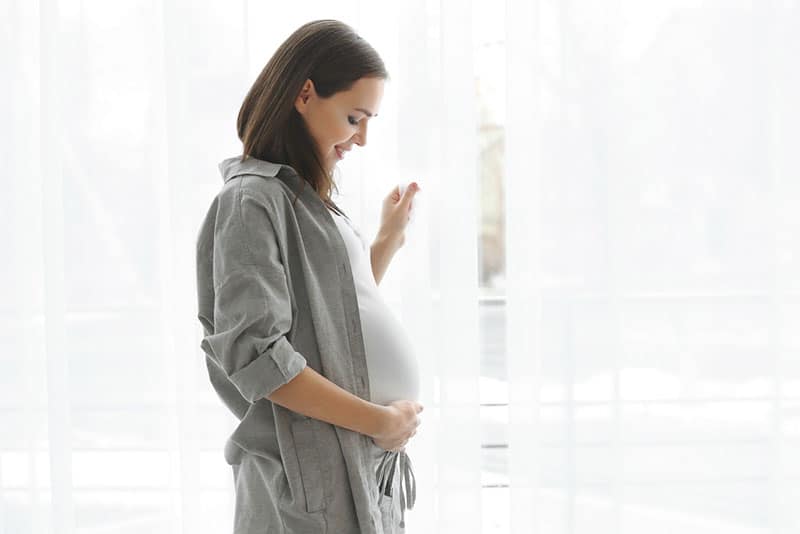
Not gaining weight doesn’t mean you’re less pregnant than any other pregnant woman, no matter what the people around you say.
Just to be clear, it’s perfectly fine both to gain weight and to stay at the same weight during pregnancy.
Every woman is unique and responds differently to carrying a baby, so you shouldn’t compare yourself to others.
However, if you start losing weight within the first few months, you should talk to a medical professional.
13. False periods

One of the most common reasons many women don’t feel pregnant anymore is light bleeding that can remind them of getting their period.
After missing your period and getting a positive pregnancy test, you might notice light bleeding which makes you think that you might not be pregnant after all.
Light spotting may be a sign of implantation bleeding or other minor issues that won’t affect the development of your baby.
But, if it turns into heavier bleeding, it’s time to pay a visit to the doctor’s office.
14. Not affected by hormonal changes
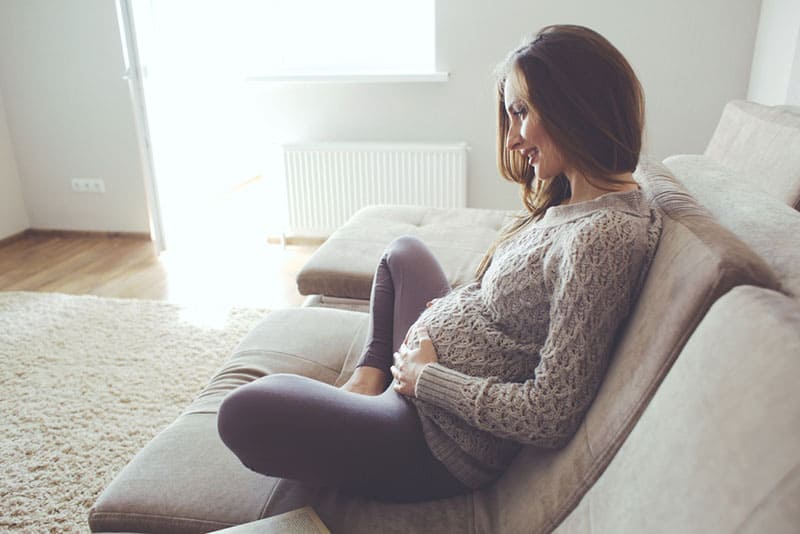
Going through pregnancy without experiencing most of the pregnancy symptoms sounds unbelievable, but it’s far from impossible.
Some women are simply not as affected by the changing hormones during pregnancy, meaning that their bodies go through the same changes other pregnant women go through but they simply don’t “feel” it.
15. Regular sleeping pattern

Even though insomnia during pregnancy is completely normal, not all women suffer from it.
Having a regular sleep pattern during pregnancy is the best thing that can happen to you and no reason for concern, so make sure to use every opportunity to sleep before your little one is born.
Final Thoughts
Pregnancy is typically described as one of the most beautiful experiences for every woman who is eager to become a mother.
But, there are numerous factors that might cause anxiety and stress as well, especially during the first trimester.
A woman’s body goes through immense changes which manifest in various ways.
Every pregnancy is a unique experience and shouldn’t be compared or generalized in any way.
Pregnancy symptoms offer peace to many women, even though they can be quite aggravating, but they shouldn’t be the only indicators of a healthy pregnancy.
The sudden disappearance or complete absence of symptoms can be a nerve-wracking but still normal process of a healthy pregnancy.
However, if you feel that something’s not right or you just want to make sure everything’s okay with your little bundle of joy, you should always speak to a healthcare professional.
Good luck!
Like this post? Please share or pin it for later. You can also stay in the loop and follow us on Facebook, Instagram or Pinterest.
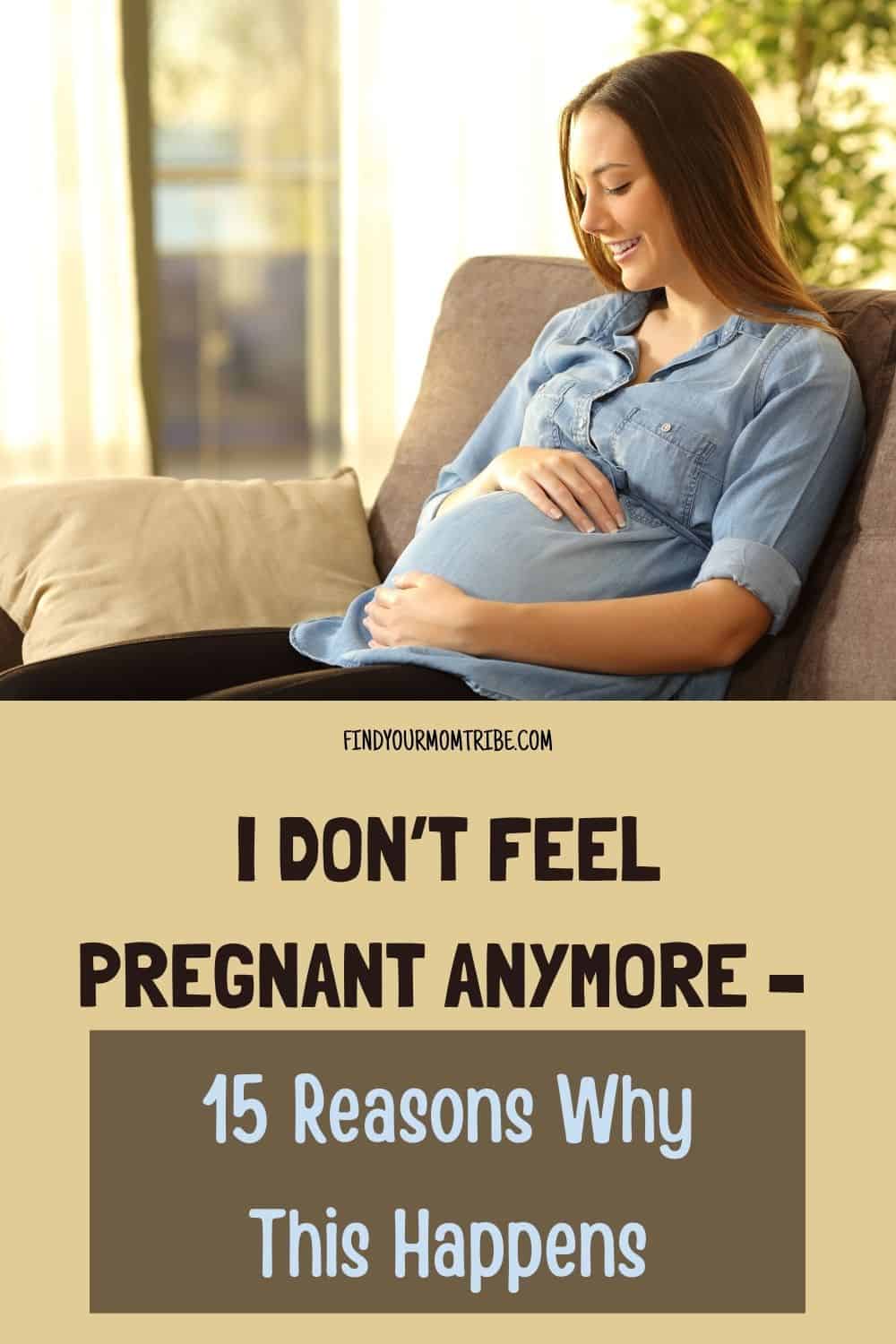
We love honesty! Find Your Mom Tribe is an Amazon Associate and we earn from qualifying purchases through affiliate links at no extra cost to you. Please see our full Amazon Affiliate disclosure for more information.

